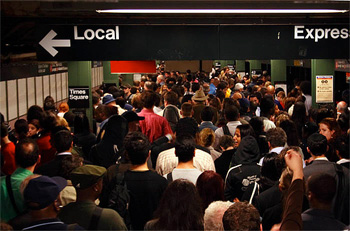The tax bill Republicans in Washington hope to pass before they head home for Christmas break will have a "devastating" effect on NYC's transit system, according to an analysis by the Riders Alliance and the Tri-State Transportation Campaign [PDF].
The MTA's $32.5 billion, five-year capital plan, which funds both maintenance and expansion, depends on $7.5 billion in federal funding. By cutting tax revenue $1.5 trillion over 10 years and blowing up the deficit, the GOP bill will create downward pressure on the federal programs that supply those funds, advocates warn.
The results could include declining service quality from deferred upgrades and maintenance, as well as service cuts and fare hikes as the MTA scrambles to close unforeseen holes in its capital budget.
"As if transit riders needed more bad news, it seems that Congressional Republicans are conspiring to make our commutes even worse," said Riders Alliance Executive Director John Raskin.
Specific capital projects currently in line for federal funding include the next phase of the Second Avenue Subway, power upgrades on the L train, and Woodhaven Boulevard Select Bus Service. Since transit funding is distributed unevenly state-by-state, with New York receiving a large share to help with its large system, Riders and TSTC worry it will be particularly vulnerable to funding cuts in the current political climate.
The tax bill won't just affect specific MTA line items. By eliminating the federal exemption for state and local tax payments exceeding $10,000, the GOP bill will create pressure on states and cities to cut taxes and spending. As a result, the fiscal climate in New York will be more constrained and austere, which will invariably put the squeeze on transit funding.
The bill would also limit the MTA's ability to refinance bonds at lower rates, increasing the costs of borrowing to pay for transit infrastructure.
The MTA shares these concerns. Agency chairman Joe Lhota told AMNY that the bill would be "devastating for New York State and particularly jarring for the MTA."
"It will result in a reduction of federal funding for mass transit, will significantly impede the MTA’s access to the capital markets and will increase the tax burden for all of our customers," Lhota said. "This legislation is not tax reform, it is tax deform and is a direct assault on all New Yorkers."






